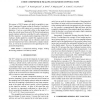Free Online Productivity Tools
i2Speak
i2Symbol
i2OCR
iTex2Img
iWeb2Print
iWeb2Shot
i2Type
iPdf2Split
iPdf2Merge
i2Bopomofo
i2Arabic
i2Style
i2Image
i2PDF
iLatex2Rtf
Sci2ools
109
click to vote
ICASSP
2009
IEEE
2009
IEEE
CMOS compressed imaging by Random Convolution
We present a CMOS imager with built-in capability to perform Compressed Sensing coding by Random Convolution. It is achieved by a shift register set in a pseudo-random configuration. It acts as a convolutive filter on the imager focal plane, the current issued from each CMOS pixel undergoing a pseudo-random redirection controlled by each component of the filter sequence. A pseudo-random triggering of the ADC reading is finally applied to complete the acquisition model. The feasibility of the imager and its robustness under noise and non-linearities have been confirmed by computer simulations, as well as the reconstruction tools supporting the Compressed Sensing theory.
| Added | 21 May 2010 |
| Updated | 21 May 2010 |
| Type | Conference |
| Year | 2009 |
| Where | ICASSP |
| Authors | Laurent Jacques, Pierre Vandergheynst, Alexandre Bibet, Vahid Majidzadeh, Alexandre Schmid, Yusuf Leblebici |
Comments (0)

